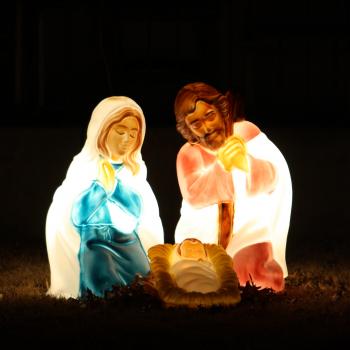
Our first son was born slowly, 24-something blurry hours from contractions intensifying to snipping the umbilical cord. So when my wife waddled into the hospital with me at her elbow and our second son on the way, I figured we had plenty of time to spare. It would be a while. They hooked her up, and I settled in with my reading material to jam to the chugga-chugga beat of the little guy’s heart on the monitor. When shortly after we arrived my wife told me to get the nurse because she thought it was time, I was nonchalant. We just got here! The nurse, however, read the monitor ticker tape, locked eyes with my wife and said “Don’t push!” Then she darted into the hall and hollered, “Get the doctor up here!” I almost had to catch our second son. He showed up on his time, not ours.
Here we are in Advent, this time of remembering and celebrating that Jesus was born. It’s a season of preparation as we anticipate Jesus’ coming again in glory and welcome him into our lives right now. “Prepare the way of the Lord,” said John the Baptist in the desert. And so we do: taking stock of our lives and readying ourselves to receive Jesus anew. I love Advent for that reason. I love the preparation. I love the waiting and longing. Winter grows darker, but we’re anticipating the Light.
Except that with all the anticipation and waiting and talk of preparing the way of the Lord, we can forget that Jesus comes whether we’re ready or not. There may be plenty of things that we could do to make ready or would do or should do to somehow tidy up our lives to make a place fit for a King. But Jesus doesn’t show up on our timing. He’s not waiting until we have it all together. Prepare all you want, but Immanuel will come on his time, not ours.
That’s a word to the wise for the return of the once-and-future King. “Of that day and that hour knoweth no man” (Mark 13:32). But it’s also a word to each of us in the here and now: we don’t set the terms for Christ’s coming into our lives.
This is a mercy. So many of us spend our entire lives setting goals, thinking about next steps, planning and planning and planning. Advent is not the time for that. It’s rather about stepping back, about taking a receptive posture. “My yoke is easy,” Jesus said. “My burden is light” (Matthew 11:30).
I for one need to hear this message right now. I’ve spent the year developing plans for our congregation to remain open or to know when to close or to reopen. I plot columns in green, yellow, and red. I try to imagine the eventualities, somehow outsmart the virus. And then nothing. Two-thirds of my plans end up in the trash bin because the earth has shifted before the time comes to implement them.
I think Advent is a time to give up our plotting and planning and just pray with the ancient church: “Come, Lord Jesus” (Revelation 22:20). We prepare the way of the Lord by not preparing. We begin to learn to open up in vulnerability to the One who created us for himself.
We’re never truly prepared anyway, and Advent’s mercy is that we are given permission to recognize our unreadiness. In fact, we can scarcely receive the gift of Advent until we recognize our complete inability to prepare the way of the Lord. We don’t have to try a little harder. We don’t have to fill in the empty spaces.
Part of the gift of Advent is the realization that it’s not all about you. We play the precious starring role in our own life stories, but not in our salvation. We cooperate with God’s grace, but in the ebb and flow of redemption, it’s Jesus who takes the first step. And he does it on his timing.
When the date drew near for our third son to arrive, I figured I had finally learned my lesson. I trusted my wife’s sense of timing and was ready, Goldilocks style, to get it just right. But he found a new way to surprise us involving a dramatic splash and then a long wait. I give up.
Thus Advent: We’re invited to give up, in the very best way, and simply wait for the Christ child to come with sacred expectancy.












